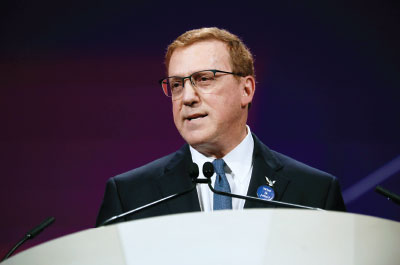Session Aims to Support, Give Voice to Medical Directors
Abstract
Saul Levin, M.D., M.P.A., will lead a group discussion with medical directors of behavioral health clinics to learn about the challenges they face and offer support and guidance.

Medical directors are highly valued for their clinical expertise, but sometimes feel their voices aren’t heard when it comes to the business side of running a ward, says Saul Levin, M.D., M.P.A.
An Annual Meeting session led by APA CEO and Medical Director Saul Levin, M.D., M.P.A., will give medical directors in community settings an opportunity to discuss the challenges they face and brainstorm ways in which APA might be able to help them.
The session, titled “Supporting Medical Directors in Behavioral Health Clinics,” is meant to facilitate conversations and ensure that medical directors’ voices are heard.
“The medical director’s role is absolutely essential,” Levin said. “They are ultimately responsible for the care and safety of the patients and clinicians: If something goes wrong, the buck stops with them. That’s why it is so important their expertise is recognized in the clinic’s operations.”
While the directors’ medical experience is regarded as necessary on the clinical side of operations, Levin said he sometimes hears from those who find they must fight to be heard when offering suggestions on the administrative side. Having spent their careers focusing on clinical care, physicians rarely have a background in business to help them communicate their patients’ needs in language that is meaningful to their clinic’s administration.
Beyond administrative issues, medical directors often find themselves grappling with the challenges facing much of the mental health treatment world, such as lack of resources and staff recruitment. Levin said he hears stories of medical directors taking up tasks, such as tending to patients’ beds, because their clinics are understaffed. “But they do it,” Levin said, “because they want the patients to feel comfortable and safe.”
Additional discussion topics include contracting, workforce development, and leadership development.
Every time Levin has held this session in the past, he said, participants have brought up issues that had not been raised the previous year.
“We want to ensure medical directors’ roles and experiences are appreciated and that their expertise is valued to the fullest extent,” Levin said. “The medical directors aren’t just there to follow rules and regulations. They must ensure their patients’ safety, as well as the safety of the other clinicians on the ward. APA is here to support and advocate for them, as we do for all our members.” ■
“Supporting Medical Directors in Behavioral Health Clinics” will be held Sunday, April 26, from 3 p.m. to 4:30 p.m.



